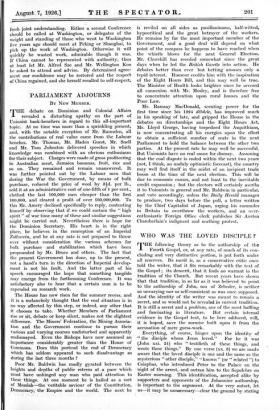PARLIAMENT ADJOURNS
BY NEW MEMBER.
THE debate on Dominion and Colonial Affairs revealed a disturbing apathy on the part of Unionist back-benchers in regard to this all-important topic. At no time was more than a sprinkling present, and, with the notable exception of Mr. Ramsden, all the contributions of real value came from the Labour benches. Mr. Thomas, Mr. Haden Guest, Mr. Snell and Mr. Tom Johnston delivered speeches in which knowledge was combined with an obvious enthusiasm for their subject. Charges were made of gross profiteering in Australian meat, Jamaica bananas, fruit, rice and so on. They remained and remain unanswered. It was further pointed out by the Labour men that during the War the Government, by means of bulk purchase, reduced the price of wool by 3id. per lb., sold it at an administrative cost of one-fifth of 1 per cent., clothed the last 100,000 men cheaper than the first 100,000, and cleared a profit of over £60,000,000. To this Mr. Amery declined specifically to reply, contenting himself by observing that if we could sustain the " high spirit " of war time many of these and similar suggestions might be carried out. Nevertheless there is hope for the Dominion Secretary. His heart is in the right place, he believes in the conception of an Imperial Zollverein, and he at any rate is not prepared to throw over without consideration the various schemes for bulk purchase - and stabilization which have been propounded by Mr. Bruce and others. The fact that the present Government has done, up to the present, not a hand's turn in the direction of Imperial develop- ment is not his fault. And the latter part of his speech encouraged the hope that something tangible may emerge from the forthcoming Conference. It was satisfactory also to hear that a certain sum is to be expended on research work.
The House has now risen for the summer recess, and it is a melancholy thought that the coal situation is in no way affected by this step, or indeed, any other that it chooses to take. Whether Members of Parliament rise.or sit, debate or keep silent, makes not the slightest difference. The Miners' Federation, the Mining Associa- tion and the Government continue to pursue their various and varying courses undisturbed and apparently undismayed. Even the Bishops have now assumed an importance considerably greater than the House of Commons. Does this portend the end of Democracy which has seldom appeared to such disadvantage as during the last three months ?
Poor Mr. Baldwin has madly gyrated between the heights and depths of public esteem at a pace which must have unhinged any man who paid attention to these things. At one moment he is hailed as a sort of Messiah—the veritable saviour of the Constitution, Democracy, the Empire and the world. The next he is reviled on all sides as pusillanimous, half-witted, hypocritical and the great betrayer of the workers. He remains by far the most important member of the Government, and a good deal will depend on what point of the compass he happens to have reached when the whistle blows for the next General Election. Mr. Churchill has receded somewhat since the great days when he led the British Gazette into action. He debates better than ever but betting arouses only a tepid interest. Rumour credits him with the inspiration of the Eight Hours Bill, and this may well be true. The Minister of Health looks brighter since he severed all connexion with Mr. Mosley, and is therefore free to concentrate attention upon rural houses and the Poor Law.
Mr. Ramsay MacDonald, scenting power for the first time since his 1924 clehdck, has improved much in his speaking of late, and gripped the House in the debates on directorships and the Eight Hours Act, Mr. Lloyd George, having torpedoed the Asquithians, is now concentrating all his energies upon the effort to obtain a sufficient number of seats in the next Parliament to hold the balance between the other two parties. At the present rate he may well be successful. But Unionists have no real cause for dismay. Assuming that the coal dispute is ended within the next two years (not, I think, an unduly optimistic forecast), the country may well find itself in the midst of an incipient trade boom at the time of the next election. This will be due to economic causes, and not least to the inevitable credit expansion ; but the electors will certainly ascribe it to Unionists in general and Mr. Baldwin in particular, and vote accordingly, unless the Daily Herald manages to produce, two days before the poll, a letter written by the Chief Capitalist of Japan, urging his comrades in Britain to overthrow the workers, and an over- enthusiastic Foreign Office clerk publishes Sir Austen Chamberlain's indignant and scathing protest.






































 Previous page
Previous page